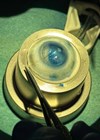
Alcon, the Swiss-American company specialising in eyecare equipment, inaugurated their Alcon Experience Centre (AEC) in Jeddah, Saudi Arabia. AEC is an eye education and training centre for students and eyecare professionals.
This is the first AEC catering to the Middle East and Africa, and I was honoured to be the first Pakistani participant in their inaugural basic cataract course, ‘Fundamentals of Cataract’. The centre itself was thoughtfully designed, with state-of-the-art equipment and an elegant infrastructure, making it an immersive experience overall.
Why I signed up for this course
Ophthalmology is an increasingly competitive speciality to secure a place within the UK. As of 2024, the competition ratio reached an unprecedented 14:1 (compared to 9:1 in 2023) according to the Health Education England statistic [1]. This means that there are 14 applicants applying for every post. Attending simulations and dry / wet labs not only helps one enhance their portfolio scores but, more importantly, provides a unique hands-on surgical experience. It gives an insight into the meticulous and intricate nature of ophthalmic surgery, which was what had driven me in the first place.
Preparing for the course
To gain a better understanding of cataract surgery basics, I watched videos on phacoemulsification to thoroughly grasp each step and its underlying rationale. Alcon has created a free online educational platform, the Alcon Experience Academy, offering modules and recorded lectures on various ophthalmology subjects, aimed at supporting students and eyecare professionals. I specifically found this resource beneficial for learning the theoretical aspects of biometry fundamentals. These self-preparation efforts enabled me to participate in the course with greater confidence.
What the course covered
The two-day course is designed for aspiring ophthalmologists, prospective ST1 applicants (especially those in their foundation years), and / or trainees who are at the start of their training and aim to strengthen the basics of cataract surgery. The days were divided as follows:
Day 1 focused on lectures covering the necessary steps a surgeon must take when planning cataract surgery and emphasised the importance of a thorough pre-op work-up to minimise the risk of complications. This was followed by a teaching session on understanding the phacoemulsification equipment and an extensive summary of phacodynamics, including how to set up the microscope and master the foot pedal controls. The importance of intraoperative ergonomics was underscored, and the discussion was about chair height, posture, shoulder and back alignment, and the placement of pedals. Lastly, we were lectured on biometry and the different formulas that are utilised for cataract surgery. The day ended with dinner, during which we had a chance to socialise and network.

Figure 1: Day 1: Cataract surgery planning, the essentials of pre-op assessment, understanding the equipment and biometry.
On Day 2, we were walked through the steps of phacoemulsification followed by hands-on guided training on bionic eyes. We were divided into two groups and our instructors led us through the simulation individually. This targeted approach was beneficial in providing real-time feedback and allowed us to identify our errors simultaneously.

Figure 2: Day 2: Surgery step by step, post-op considerations, hands-on practice.
Challenges and key learning points
Despite preparing in advance, stepping into the simulation was a humbling experience. Only under a microscope do you realise how much a natural hand tremor exists. Guiding the cystotome under a microscope in a continuous curvilinear pattern for capsulorhexis was far more challenging than I had imagined. Holding the instruments correctly is one thing, but maintaining composure and coordination with the viewing system and foot pedal is an entirely different skill.
“Only under a microscope do you realise how much a natural hand tremor exists”
I also learned about the importance of posture ergonomics, i.e., keeping the back straight, an appropriately adjusted chair height and comfortably angled elbows, which made a noticeable difference in maintaining good microsurgical control. The hands-on practice on the bionic eye allowed me to make mistakes under supervision and in a controlled environment, which I found to be incredibly valuable for my learning.
Advice for others considering this course
If you are considering undertaking the ‘Fundamentals of Cataract’ course designed by Alcon, I would recommend preparing adequately to familiarise yourself with the key concepts of cataract surgery. E-learning resources offered by the Alcon Experience Academy, especially YouTube videos, can aid in understanding the steps of surgery. Be prepared to make mistakes – remember nobody gets it right the first time. Ask questions and seek instructor feedback – they are always there to help and guide. Lastly, come with an open mind and a willingness to learn.

Presented with the certificate of participation by the course instructor at the conclusion of the training session.
TAKE HOME MESSAGES
-
Simulation based courses like the one conducted by Alcon help bridge the gap between theory and surgical practice.
-
Pre-course preparation through e-learning builds confidence and allows for better understanding.
-
Posture, positioning and hand control are essential early skills in cataract surgery.
-
Real-time feedback during dry-lab practice is invaluable for beginners.
-
Making mistakes under supervision help build both technique and insight.
Reference
1. Nath U. The 2025 Ophthalmology ST1 portfolio scoring criteria and key changes from 2024. J Foundations Ophthalmol 2024. DOI:10.48089/jfo7688211








